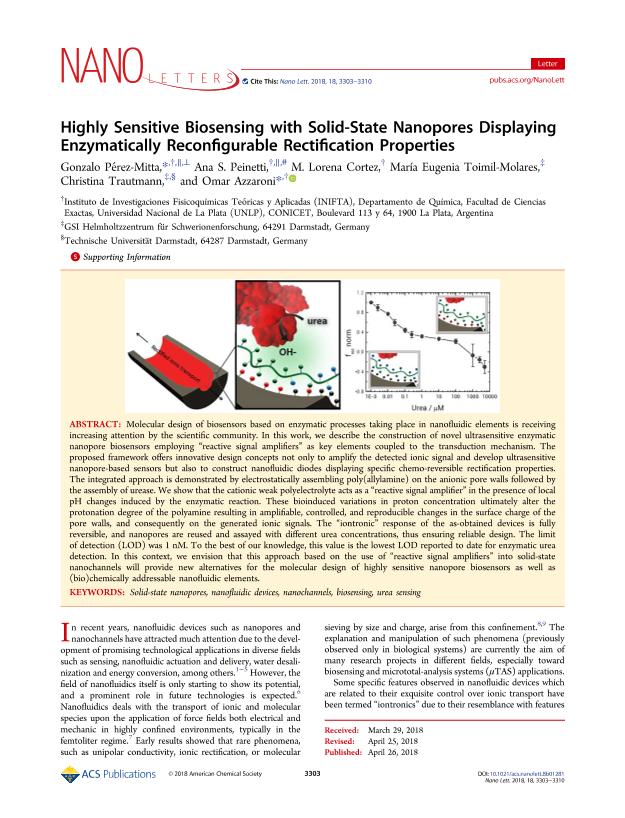Artículo
Highly Sensitive Biosensing with Solid-State Nanopores Displaying Enzymatically Reconfigurable Rectification Properties
Perez Mitta, Gonzalo ; Peinetti, Ana Sol
; Peinetti, Ana Sol ; Cortez, María Lorena
; Cortez, María Lorena ; Toimil Molares, María Eugenia; Trautmann, Christina; Azzaroni, Omar
; Toimil Molares, María Eugenia; Trautmann, Christina; Azzaroni, Omar
 ; Peinetti, Ana Sol
; Peinetti, Ana Sol ; Cortez, María Lorena
; Cortez, María Lorena ; Toimil Molares, María Eugenia; Trautmann, Christina; Azzaroni, Omar
; Toimil Molares, María Eugenia; Trautmann, Christina; Azzaroni, Omar
Fecha de publicación:
05/2018
Editorial:
American Chemical Society
Revista:
Nano Letters
ISSN:
1530-6984
Idioma:
Inglés
Tipo de recurso:
Artículo publicado
Clasificación temática:
Resumen
Molecular design of biosensors based on enzymatic processes taking place in nanofluidic elements is receiving increasing attention by the scientific community. In this work, we describe the construction of novel ultrasensitive enzymatic nanopore biosensors employing "reactive signal amplifiers" as key elements coupled to the transduction mechanism. The proposed framework offers innovative design concepts not only to amplify the detected ionic signal and develop ultrasensitive nanopore-based sensors but also to construct nanofluidic diodes displaying specific chemo-reversible rectification properties. The integrated approach is demonstrated by electrostatically assembling poly(allylamine) on the anionic pore walls followed by the assembly of urease. We show that the cationic weak polyelectrolyte acts as a "reactive signal amplifier" in the presence of local pH changes induced by the enzymatic reaction. These bioinduced variations in proton concentration ultimately alter the protonation degree of the polyamine resulting in amplifiable, controlled, and reproducible changes in the surface charge of the pore walls, and consequently on the generated ionic signals. The "iontronic" response of the as-obtained devices is fully reversible, and nanopores are reused and assayed with different urea concentrations, thus ensuring reliable design. The limit of detection (LOD) was 1 nM. To the best of our knowledge, this value is the lowest LOD reported to date for enzymatic urea detection. In this context, we envision that this approach based on the use of "reactive signal amplifiers" into solid-state nanochannels will provide new alternatives for the molecular design of highly sensitive nanopore biosensors as well as (bio)chemically addressable nanofluidic elements.
Archivos asociados
Licencia
Identificadores
Colecciones
Articulos(INIFTA)
Articulos de INST.DE INV.FISICOQUIMICAS TEORICAS Y APLIC.
Articulos de INST.DE INV.FISICOQUIMICAS TEORICAS Y APLIC.
Citación
Perez Mitta, Gonzalo; Peinetti, Ana Sol; Cortez, María Lorena; Toimil Molares, María Eugenia; Trautmann, Christina; et al.; Highly Sensitive Biosensing with Solid-State Nanopores Displaying Enzymatically Reconfigurable Rectification Properties; American Chemical Society; Nano Letters; 18; 5; 5-2018; 3303-3310
Compartir
Altmétricas



